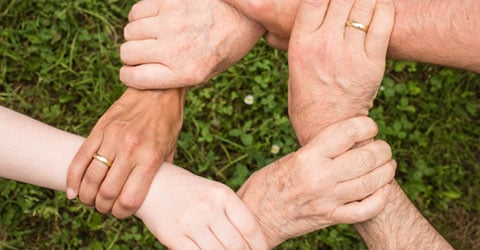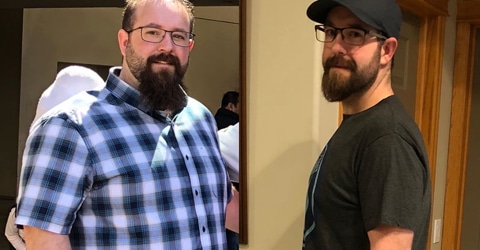

Scientific evidence obtained through rigorous methods is critical when advising the public on healthy eating patterns, especially since diet plays such a large role in long-term health.[1-5] But scientific studies are not without limitations. While they may prove that a certain diet works, they often don’t give guidance on putting that information into practice.
The “gold standard” in evidence quality is the randomized control trial (RCT) where participants are split into two groups: the control group gets a placebo (no treatment) while the treatment group receives the intervention.[6] Ideally, the study is blinded, meaning that neither group knows which group they’re in, reducing the chance of the placebo effect. The RCT controls for all other factors between the groups (physical activity, age, etc.) so that differences in outcomes can only be attributed to the absence or presence of the treatment. When it comes to dietary lifestyle, however, such studies are incredibly difficult to conduct, for a number of logistical reasons. First, they are too strict to maintain for long periods of time, as is preferred when studying chronic diseases. Second, they don’t lend themselves to testing broad dietary patterns including whole foods; in order to maintain the level of control necessary for the RCT, researchers have to control how much and what participants eat in a very precise way. They have to control these factors to such an extent that they are no longer studying realistical dietary patterns and likewise cannot realistically provide support for translating treatment protocols to real world lifestyles;[7] thus, weight loss, cholesterol, and blood glucose improvements quickly rebound in the months after a study concludes.[8]
Jumpstart programs and social support groups present a very important supplement to the rigorous studies described above: they offer guidance for the practical application of evidence-based dietary advice for long-term lifestyle change.
In clinical trials, patients are prescribed strict diet plans that allow no room to personalize for individuals’ needs or preferences. And that’s the point: scientists want to see how effective a specific pattern of eating is on affecting health outcomes. To do so, they need to have precise measurements, down to the grams of protein consumed and decimal places of pounds lost. Any deviations from the plan result in decreased confidence in the diet’s effectiveness and in the validity of the study. And while this rigor is what allows for research to influence public policy and medical practice, it once again does little to help transform practice: it creates unrealistic expectations on individuals to follow diet plans without educating them on how to do so. After all, we live in complex, evolving communities, not sterile, controlled laboratories.
Jumpstart programs and social support groups present a very important supplement to the rigorous studies described above: they offer guidance for the practical application of evidence-based dietary advice for long-term lifestyle change. In research, these are akin to “self-management education” programs, where, instead of a doctor prescribing you a diet that interrupts your lifestyle, you are guided through skill- and community-building resources that shift your routines towards health-promoting practices.[9]
Instead of passively receiving a diet plan in a clinical trial, participants in these more informal programs engage actively in lessons about nutrition, how to shop and cook affordably, and how to stay on track in social situations. The Center for Nutrition Studies (CNS) offers a 7-day Kickstart that incorporates recipes and plant-based education.[10] Programs like these are often paired with community support groups such as Chef Del Sroufe’s Diet Daze Facebook Group, where people can share ideas, knowledge, struggles, and successes for sustainable weight loss and health. It is well known that many factors, including social context, convenience, and preference, influence food choices;[11] and research has shown that interventions that incorporate nutrition education and social support are integral to long-term health behavioral change. [9,12,13]

Well-designed clinical studies provide important evidence for the power diet can play in the prevention, management, and reversal of some lifestyle diseases,[4,14-16] but there are other tools worth utilizing. By paying respects to non-clinical, community-led efforts to provide the missing support components needed for successful lifestyle changes, we elevate the evidence obtained in clinical studies. We bring those findings into the world of practice and create countless opportunities for sustainable change. While there is limited data on the quantitative effectiveness of these programs in the scientific literature, that’s almost the beauty of it: no strict randomization, weighing of foods, clinical lab visits, etc. Instead, you get to engage with healthy habits in your own environment, on your own terms. So, if you or a loved one is ever motivated to start a new health journey, don’t just settle on a meal plan or delivery service. None of us has to do it alone! Find a support group or community page where you can ask questions, learn cooking and physical activity skills, and make health a more sustainable, communal practice.
References
- Barnard ND, Alwarith J, Rembert E, et al. A Mediterranean Diet and Low-Fat Vegan Diet to Improve Body Weight and Cardiometabolic Risk Factors: A Randomized, Cross-over Trial. J Am Coll Nutr. February 2021:1-13. doi:10.1080/07315724.2020.1869625
- Shah B, Newman JD, Woolf K, et al. Anti-Inflammatory Effects of a Vegan Diet Versus the American Heart Association-Recommended Diet in Coronary Artery Disease Trial. J Am Heart Assoc. 2018;7(23):e011367. doi:10.1161/JAHA.118.011367
- Aigner A, Becher H, Jacobs S, et al. Low diet quality and the risk of stroke mortality: the multiethnic cohort study. Eur J Clin Nutr. 2018;72(7):1035-1045. doi:10.1038/s41430-018-0103-4
- Bail J, Meneses K, Demark-Wahnefried W. Nutritional status and diet in cancer prevention. Semin Oncol Nurs. 2016;32(3):206-214. doi:10.1016/j.soncn.2016.05.004/li>
- Palacios OM, Kramer M, Maki KC. Diet and prevention of type 2 diabetes mellitus: beyond weight loss and exercise. Expert Rev Endocrinol Metab. 2019;14(1):1-12. doi:10.1080/17446651.2019.1554430
- Kendall JM. Designing a research project: randomised controlled trials and their principles. Emerg Med J. 2003;20(2):164-168. doi:10.1136/emj.20.2.164
- Most MM, Ershow AG, Clevidence BA. An overview of methodologies, proficiencies, and training resources for controlled feeding studies. J Am Diet Assoc. 2003;103(6):729-735. doi:10.1053/jada.2003.50132
- Loveman E, Frampton GK, Shepherd J, et al. The clinical effectiveness and cost-effectiveness of long-term weight management schemes for adults: a systematic review. Health Technol Assess. 2011;15(2):1-182. doi:10.3310/hta15020
- Markle-Reid M, Ploeg J, Fraser KD, et al. Community Program Improves Quality of Life and Self-Management in Older Adults with Diabetes Mellitus and Comorbidity. J Am Geriatr Soc. 2018;66(2):263-273. doi:10.1111/jgs.15173
- Center for Nutrition Studies. Whole Foods, Plant-Based Diet Sample Menu. The Center for Nutrition Studies. https://nutritionstudies.org/whole-foods-plant-based-diet-sample-menu/. Published January 9, 2019. Accessed February 7, 2021.
- Furst T, Connors M, Bisogni CA, Sobal J, Falk LW. Food choice: a conceptual model of the process. Appetite. 1996;26(3):247-265. doi:10.1006/appe.1996.0019
- Wagner MG, Rhee Y, Honrath K, Blodgett Salafia EH, Terbizan D. Nutrition education effective in increasing fruit and vegetable consumption among overweight and obese adults. Appetite. 2016;100:94-101. doi:10.1016/j.appet.2016.02.002
- Burgess E, Hassmén P, Welvaert M, Pumpa KL. Behavioural treatment strategies improve adherence to lifestyle intervention programmes in adults with obesity: a systematic review and meta-analysis. Clin Obes. 2017;7(2):105-114. doi:10.1111/cob.12180
- World Health Organization. Diet, Nutrition and the Prevention of Chronic Diseases. World Health Organization; 2004.
- Barnard ND, Katcher HI, Jenkins DJA, Cohen J, Turner-McGrievy G. Vegetarian and vegan diets in type 2 diabetes management. Nutr Rev. 2009;67(5):255-263. doi:10.1111/j.1753-4887.2009.00198.x
- Pischke CR, Scherwitz L, Weidner G, Ornish D. Long-term effects of lifestyle changes on well-being and cardiac variables among coronary heart disease patients. Health Psychol. 2008;27(5):584-592. doi:10.1037/0278-6133.27.5.584
Copyright 2026 Center for Nutrition Studies. All rights reserved.
Deepen Your Knowledge With Our
Plant-Based Nutrition
Certificate
Plant-Based Nutrition Certificate
- 23,000+ students
- 100% online, learn at your own pace
- No prerequisites
- Continuing education credits






